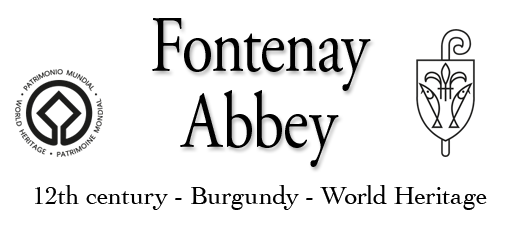Around Fontenay
Northern Burgundy is particularly rich with historical and tourist sites, all within 1 hour of Fontenay.
Montbard - 6 km
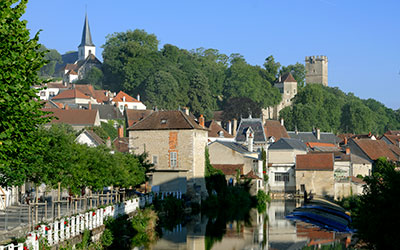 Montbard is located a few kilometers from the Abbey of Fontenay. It is a town crossed by the Canal de Bourgogne and easily accessible by TGV.
Montbard is historically related to Fontenay. The mother of Saint Bernard was the daughter of the Lord of Montbard. The feudal castle was taken over by the naturalist Buffon in the eighteenth century, and its remains can still be visited today.
Montbard is located a few kilometers from the Abbey of Fontenay. It is a town crossed by the Canal de Bourgogne and easily accessible by TGV.
Montbard is historically related to Fontenay. The mother of Saint Bernard was the daughter of the Lord of Montbard. The feudal castle was taken over by the naturalist Buffon in the eighteenth century, and its remains can still be visited today.
Information: www.ot-montbard.fr
Forge de Buffon - 11 km
 The Great Forge de Buffon was founded in 1768 by the renowned naturalist Buffon, who was from Montbard. This forge was designed to be an effective and integrated plant, grouping in a single location the furnace, refinery and splitting mill, but also houses for the forge master and workers, as well as all the necessary support buildings.
The Great Forge de Buffon was founded in 1768 by the renowned naturalist Buffon, who was from Montbard. This forge was designed to be an effective and integrated plant, grouping in a single location the furnace, refinery and splitting mill, but also houses for the forge master and workers, as well as all the necessary support buildings.
La Grande Forge de Buffon is the heiress of the Forge de Fontenay, which is recognized as one of the very first ironworks in Europe.
The Forge is open to visitors.
Information: www.grandeforgedebuffon.fr
Alesia - 15 km
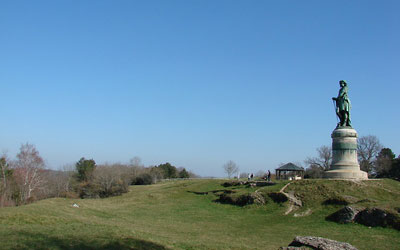 Alesia is the presumed site of the Battle of Alesia in 52 BC which saw the victory of the armies of Caesar over Vercingetorix, marking the beginning of Roman Gaul.
Alesia is the presumed site of the Battle of Alesia in 52 BC which saw the victory of the armies of Caesar over Vercingetorix, marking the beginning of Roman Gaul.
Since 2012, the MuséoParc site at Alesia allows visitors to understand this battle and its impact on the history of France.
Information: www.alesia.com
Semur-en-Auxois - 22 km
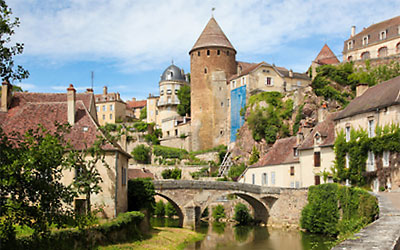 Semur is a medieval city which originated before the seventh century. Its name comes from a Latin variation of "old walls". Today it is dominated by towers built in the 14th century and partially destroyed in the 17th.
Semur is a picturesque tourist destination with many monuments, as well as hotels and restaurants.
Festivals are held in the city every year since the end of May 1638.
Semur is a medieval city which originated before the seventh century. Its name comes from a Latin variation of "old walls". Today it is dominated by towers built in the 14th century and partially destroyed in the 17th.
Semur is a picturesque tourist destination with many monuments, as well as hotels and restaurants.
Festivals are held in the city every year since the end of May 1638.
Information: www.tourisme-semur.fr
Vézelay - 59 km
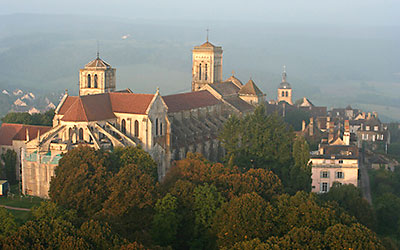 The holy hill of Vézelay, surmounted by the Basilica of St. Mary Magdalene, is a prominent French sacred art site.
The holy hill of Vézelay, surmounted by the Basilica of St. Mary Magdalene, is a prominent French sacred art site.
This church, built between the 9th and 12th century to house the relics of St. Mary Magdalene is one of the main points of departure of the Santiago Camino pilgrimage.
St. Bernard preached the Second Crusade in Vezelay in 1146.
Vézelay and Fontenay have been the first two sites in Burgundy listed as World Heritage by UNESCO. They have been joined by the Climats of Burgundy in 2015.
Information: www.basiliquedevezelay.org and www.vezelaytourisme.com
Dijon - 78 km
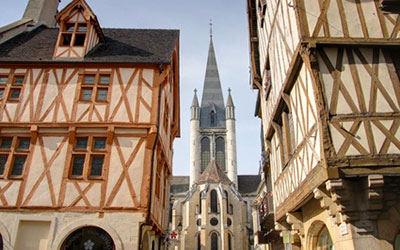 Dijon is the capital of Burgundy. Former capital of the Dukes of Burgundy, Dijon offers visitors a rich heritage composed of many churches, mansions and museums.
Dijon is the capital of Burgundy. Former capital of the Dukes of Burgundy, Dijon offers visitors a rich heritage composed of many churches, mansions and museums.
It is also a renowned food capital.
Information: www.visitdijon.com
Clos Vougeot - 89 km
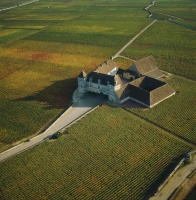
Standing in the very heart of Burgundy’s vineyards, it was originally a wine farm, built in the 12th century by monks from the nearby Abbey of Cîteaux. In the 16th century, a Renaissance style château was added to the existing buildings.
With its medieval vat-house and presses, Cistercian cellar and original kitchens, it forms a unique architectural whole, attracting history lovers, architecture lovers or wine lovers. The Chateau du Clos de Vougeot also hosts famous receptions. It is renowned as one of the very best “table d’hôte” of France.
Even though the Chateau du Clos de Vougeot does not produce wine anymore, it stays the symbol of a millenary of Burgundy’s History.
The Confrérie des Chevaliers du Tastevin acquired the Château in 1945, and started to restore it, turning it into the seat of the Order.
Information: www.closdevougeot.fr
Beaune - 96 km
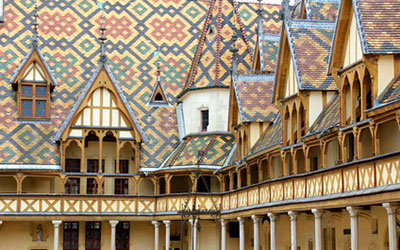 Beaune is located in the middle of the great vineyards of Burgundy; it is the capital of Burgundy wines. It is also a city of art known for its Hôtel-Dieu, former hospital of the 15th century that is home to a magnificent polyptych of the Last Judgment by Rogier van der Weyden.
Beaune is located in the middle of the great vineyards of Burgundy; it is the capital of Burgundy wines. It is also a city of art known for its Hôtel-Dieu, former hospital of the 15th century that is home to a magnificent polyptych of the Last Judgment by Rogier van der Weyden.
Information: www.beaune-tourisme.fr




